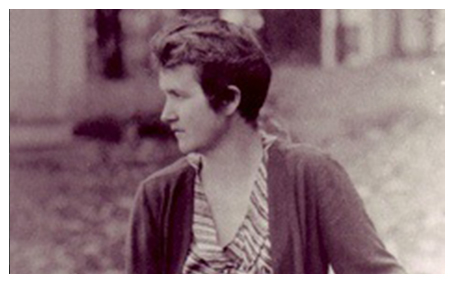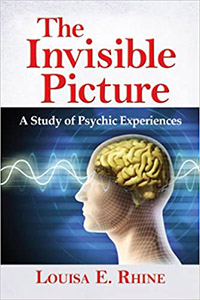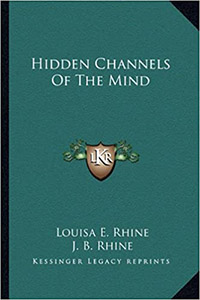Ghost Stories
by James M Deem
Mrs. Goodeve: Three Ghosts after Midnight
Pleading Ghost of Johnny Minney

Back to Main Ghost Stories

Recommended Books
by Louisa E. Rhine
One of the most respected names in the field of parapsychology is the late Louisa E. Rhine, who was a researcher at Duke University's parapsychology laboratory. Professor Rhine collected and investigated countless reports of supernatural activities, many of which she reported in her books. What follows are four of the cases she investigated.
Case 1: The One-note Ghost
A young widow  named Miriam, who was still in mourning over the sudden and unexpected death of her husband, contacted Rhine with her ghostly experience.
named Miriam, who was still in mourning over the sudden and unexpected death of her husband, contacted Rhine with her ghostly experience.
Miriam had been talking to her sister Janet one day about her husband's death, when she was overcome with grief. Out of respect for Miriam's privacy, Janet left the room, as her sister collapsed on her bed.
“Glen, Glen,” Miriam called to her husband, “if you are still alive somewhere, please, please let me know. Reach me some way. Give me some sign.” Then she prayed, “Dear God, help me to know. Help me to be sure.”
Immediately after her prayer ended, she heard a loud note sound from the downstairs piano. When it ended, the same note rang again. She wondered if her children who had been playing with their friends outside had entered the house and banged on the piano.
Then she heard Janet calling her.
“What's wrong?” Miriam asked.
“Nothing,” Janet called from the front hall.
“Only--were you just downstairs?”
“No, I'm upstairs--or I was,” Miriam said, as she came down the stairs.
“I thought so,” Janet said. Together they walked into the living room. No one was there.
“It's strange,” Janet continued, “I heard a note on the piano, a pause, then the same note twice.”
“I did, too,” Miriam said. “In fact, I can still hear it ringing in my ears.”
“Then who did it?” Janet asked. “Because I know I heard the piano, and no one's been in here.”
Janet touched the piano's keyboard and found the note they had heard. She struck it firmly, and the sound filled the air.
“You know,” Miriam said, “I had just been praying for a sign from Glen.” Janet clutched her sister's hand and laughed self-consciously. “Well, you were asking if he were A-live, and the note we heard was A. That means he is.”
Had Glen's ghost played the note twice on the piano? Had he given Miriam a sign? Miriam and Janet believed that he had.

Case 2: A Wedding Day Ghost
Rita Shepherd was so intrigued with an incident she found in her mother's diaries that she contacted Professor Rhine with the account.
When Rita's parents, Ed and Margaret McMillan were married in rural Utah shortly after the turn of the century, there were no automobiles for transportation and no telephones for communication. On their wedding day, Ed hitched a team of horses to the wagon and drove his new wife across two mountains to another town for a fancy wedding dinner. During the dinner, Ed was called from the table and handed a telegram which stated that Margaret's mother had died.
Because he did not want to spoil her wedding day, Ed did not tell Margaret what had happened.
“I want to go home,” he told her.
“But it's after dark,” Margaret said. “Can't we spend the night here?”
“No,” Ed replied. “I want to go home right now.”
Perhaps Margaret sensed the tone of urgency in his voice. Perhaps she could tell that something had upset him. Whatever she thought, she didn't question her husband further.
Their friends gave them a fresh team of horses, and they began the long, dark trip through the mountains. Half-way there, a thunderstorm struck and they found them-selves surrounded by lightning.
And this is what Margaret reported the next day in her diary:
The rain came down in torrents amidst deafening bursts of thunder and piercing flashes of lightning. I was horribly frightened and somehow in the darkness we got off the road. Suddenly the horses lunged backwards and stopped still. At that moment a blaze of lightning emblazoned the scene and I saw my mother standing in front of those horses with her arms outstretched. We were at the very brink of a precipice which dropped straight down to the river far below.
Now I do not think this is to be an idle dream or fancy. I did not then know my mother was dead, but just as firmly as I have ever believed anything in my life I believe that Mother--in spirit--stopped those horses thus saving our lives.
Margaret believed that her mother's ghost appeared to prevent her death. In this case Professor Rhine wasn't so certain. Couldn't the horses have become aware of their predicament and lunged backward themselves without the appearance of a ghost? Couldn't Margaret have imagined her mother in the flash of a lightning bolt?
Although Rhine had her suspicions, Margaret stuck to her story throughout her life and recorded it in her diary as a keepsake for her family.

Case 3: The Ghost's Letter
An unusual case was given to Professor Rhine by a college English professor. She had asked her students to write a brief narrative about an unforgettable experience in their lives. The professor was so stunned by one of the papers, by a student named John, that he gave a copy to Professor Rhine. Although she was unable to verify the episode, it remains an interesting possibility.
As a child, John lived with his family in Oregon where they managed a hotel. One morning when he was four, he said goodbye to his father who left for a business trip to New York City. While there, he died unexpectedly.
Two weeks later, John, who knew nothing about the alphabet or writing, found a pad of paper one evening and began to make marks on it. He went through three or four sheets of paper before his mother saw him.
“Stop wasting so much paper,” she told him.
“Why don't you find something else to play with?” John obediently folded the papers, placed them in his mother's mailbox behind the hotel's front desk, and found something else to occupy his time. The next morning, his mother discovered the papers in her box and showed them to the clerk at the front desk.
“I think John wants to be a writer,” she said.
“Just look at all these scribbles.”
The clerk, who was taking courses at night school, took a close look.
“That looks like shorthand,” she said. “I just started a course in it last week.”“That can't be,” John's mother replied.
“Let me take it to my teacher and find out,” she said.
In fact, the clerk discovered that John's scribblings were an older style of shorthand. John had written a message with no stray marks or mistakes; everything made complete sense. The message began, “Dearest Beloved,” which was a special term of endearment between John's father and mother. It then mentioned an unmailed letter and the location of a safe-deposit box.
As John concluded his English paper:
While he was a young man, [my father] had learned shorthand, the old-fashioned method. Mother still has those pieces of paper and the message has been translated by other people and is actually there. It was years later, when I was old enough to understand, that Mother told me the story and showed me the papers.
A shorthand letter from a ghost or a tall tale? How could a four-year-old boy produce such a letter unless he had been guided by his father's ghost? Of course, without seeing the actual papers herself, Professor Rhine couldn't be certain that John was telling the truth.

Case 4: Aunt Ann's Poltergeist
Ann Henderson died in 1958 at the age of ninety-seven. Ann's Virginia house and its furniture were left to her nephew George Preston and his family. Most people who inherit houses choose to sell them, but not George.
Shortly after they moved into Aunt Ann's house George went away on business, leaving his wife Charlotte and his sons at home. Late that night, Charlotte heard footsteps in the upstairs hallway, and wondered if her children were awake and fooling around. When she checked, she found them asleep in their beds. Perhaps because she was in a new residence, perhaps because she was alone, she considered another thought: a burglar had entered the house. She listened intently for any other sounds and plotted what she would do if she detected a robber: she would open her bedroom window and shout for the neighbors.
She spent a sleepless night but heard no other noises. When George returned home and she related her experience, he wasn't particularly sympathetic.
A week and a half went by, and one night, George and Charlotte were in their bedroom, both reading. Around midnight they heard footsteps. George checked his sons, but they were sleeping. The footsteps continued for most of the night.
As Professor Rhine commented, here were two episodes that involved the sound of mysterious footsteps, apparently unrelated to the presence of anyone in the house. The sound of footsteps can't be gathered as evidence of a ghost, and what one person thinks is a footstep may be a creaky old floorboard noise to another.
But other information needed to be considered--such as Aunt Ann's furniture.
Directly over George and Charlotte's bedroom was a large attic room in which most of Aunt Ann's furniture was stored. It was from this room that the footsteps were heard most often. They wondered if Aunt Ann was disturbed that her furniture had been piled into the storage room. So they had it removed to a storage warehouse. After that, they heard no more footsteps.
Still other strange events occurred. Two happened while the Prestons were reading in their living room. One night, a large, rather old-fashioned bobby pin fell onto Charlotte's book and bounced into her lap. Charlotte looked up, but the ceiling was smooth and could not have hidden a hairpin. A few nights later, George had his feet propped on a large ottoman when it began to wobble violently as if someone were pushing it from below. Then it stopped just as quickly as it had begun.
One morning, Charlotte found herself covered with a blanket that she had put in the hall closet before going to bed.
“Thank you for putting that extra blanket on me,” she told her husband. “It was colder than I thought.”
“I didn't cover you with anything,” he said.
Another day, Charlotte was talking to a gardener outside when a tulip bulb smacked him on the head. No one else was nearby. He was so stunned--and scared--that he was ready to quit his job.
Finally, Charlotte reported that, while she was sewing one day, she had heard a loud object fall and shatter into pieces, much like a mirror. Of course, nothing in the house appeared broken; nothing could explain the unusual noise.
Like most real hauntings, this one ended with a whimper. There were no major revelations, no terrifying episodes. There were simply questions: was Aunt Ann haunting the house? Or was Charlotte--the only person who was present at each incident--causing poltergeist activity?

Copyright © James M. Deem. Originally published in Ghost Hunters (Avon, 1992). All rights reserved.

